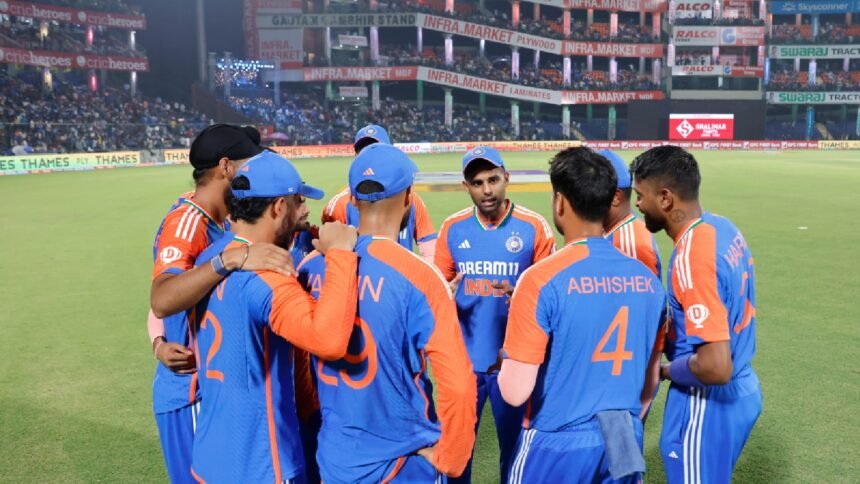Less than six months after winning the Champions Trophy when they beat New Zealand in Dubai, India can expect vastly different conditions to what they encountered then. If slow and tired pitches were the norm then, a totally different challenge awaits India.
With this being peak summer in the UAE – the organisers have already pushed back the start timings by half-an-hour 6.30pm local time so that the temperature comes down to mid-30s – there are plenty of natural elements and conditions that India needs to overcome.
Primarily two challenges await them: the pitches in Dubai and Abu Dhabi, and dew. Tony Hemming, who was the head curator from 2007 to 2017, overseeing the making of pitches in the ICC International Academy and the Dubai International Stadium says as much.
“I believe that the pitches will not behave as they have for the last two years. Now, looking at the ground in the last two weeks, they have got a grass cover and the pitches should have better carry to the keeper and should have better pace onto the bat,” Hemming tells The Indian Express.
It’s a sentiment shared by former India player and assistant coach Robin Singh, who knows the conditions well as he has been UAE’s head coach in the past.
“It will be scorching heat, so bowling first is safe. You will feel more in the game because at this time, the pitches are usually fresh. There will be some grass. In Dubai, the bounce will be low, so spinners will also be in play, “Robin tells The Indian Express. To ensure the pitch from breaking apart in the heat, the groundstaff at Dubai usually have it covered during the day time, particularly when there is no shadow cover. Once the covers are removed, there will be sweating or moisture on the grass (which is common in Dubai to hold the pitch firm) which will allow seamers to get movement with the new ball. Even for spinners, the first half is the best time to bowl as in wet conditions, gripping it will become a huge task in itself.
Chasing better due to dew
The point about bowling first isn’t said lightly by Robin or the former curator for that matter as dew is set to play a big role in this tournament, as opposed to what we saw in Champions Trophy.
Story continues below this ad
“Dew will be a huge factor,” Robin feels. “Since it is the middle of the summer, the evenings will definitely see dew, which means this will be a tournament where the conditions will be perfect to chase. The conditions will definitely be batting friendly, but teams that bat first will have a totally different challenge,” says Robin who was part of India’s support staff when they clinched the inaugural T20 World Cup in South Africa in 2007.
The dew factor is inescapable due to the timing of the tournament and the start of the games. The former curator Hemming explains. “Let’s concentrate on September. In September, your humidity levels have been between 60 and 80 per cent. Therefore, I see temperature drops from, say, 38 to 28 overnight. There’s obviously a change in the atmosphere. Therefore, dew is created now.”
These conditions aren’t new to India. In 2021, when the Indian Premier League resumed in the UAE, out of the 13 matches played in Dubai – only four matches saw teams successfully defend totals and all of them had 6 pm starts. At Abu Dhabi, out of 8 fixtures, five were won by teams that chased. It isn’t completely one-sided where toss will dictate the fate of the game, but the role of dew can’t be undermined. Even when UAE hosted the T20 World Cup in 2021 during the months of the second half of the summer, out of the 13 matches at Dubai, 12 were won by teams that batted second. At Abu Dhabi’s Zayed Stadium in the 7 night games, teams were able to successfully defend totals on four occasions.
“Dubai stadium is closed, so there is always more dew. Abu Dhabi is a lot more open, so there is occasional breeze that aids ball movement even in the second half of the game,” says Robin who also coached MI Emirates in the ILT20, a franchise tournament in the UAE. A point stressed by the curator Hemming too. “The difference between the two venues is that Dubai is like a bowl-shaped roof. So the roof is, I think from memory, 48 metres high. It’s creating a different climate within the venue. Where Abu Dhabi has one stand at the end with a thick cap. The rest of it has this open space. So the two venues do behave a little bit differently. However, if the dew is falling in Abu Dhabi, it’s going to fall pretty heavily,” Hemming says.
Story continues below this ad
At Dubai, in particular, where India will play most of its matches in the tournament, Robin says the closed structure of the stadium means the ball tends to travel a lot. “If you are batting first, then you are constantly looking to search for the extra 15-20 runs than the par score to have as a cushion because of the onset of dew in the second half of the game,” Robin says.
But that is just one side of the story. As scoring runs in the first half could also be the most challenging part as well. But when you are bowling second, all of it changes. There won’t be much of a movement and I’m not sure how effective spinners will be because of the dew factor. As batsmen, they will relish batting second as it is always the best time to bat,” Robin adds.
It is not all doom for teams when it comes to defending totals. Pointing out to the experience of playing in the IPL, which is played in the summer where dew is a constant presence, Robin says India just need to get their planning right. “If you are a pacer, the cross seam deliveries will be very effective. You got the hit the deck more often and bowl in the line of stumps. Since the outfield is huge, the short balls – which skid, will be very handy,” says Robin who also picks out deliveries to avoid. “In T20s, pacers rely on yorkers, but with dew it brings its own risks as it won’t be easy to grip the ball and execute it with precision. In such conditions, the hard-length deliveries will go to one for pacers,” he points out.
During the Champions Trophy, India had employed the spin quartet of Kuldeep Yadav, Ravindra Jadeja, Axar Patel and Varun Chakaravarthy to bundle opposition. For the Asia Cup, Robin believes, India may have to slightly tweak their strategy to be prepared for all conditions. “If you have three seam options and three spinners, you will be more or less sorted. You need to build pressure there and it won’t be a case of them dominating from word go. You need to wait for the situation and capitalise. You need to keep looking to arrest the initiative. That will be the key,” Robin says.








